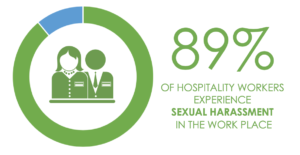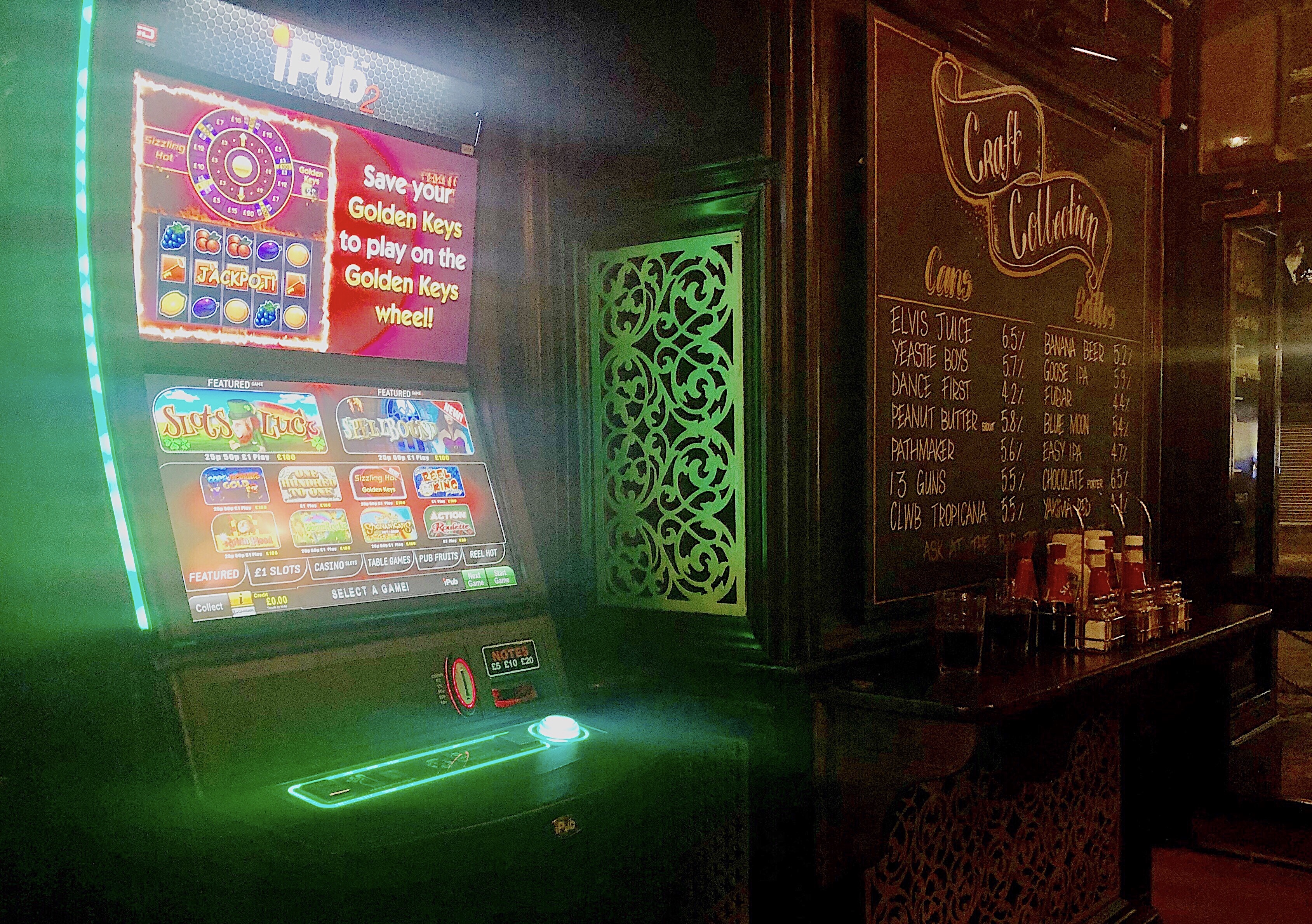
29 Jan Dissertation Draft – Emma Parker
Aims, Objectives and Audience
With this news piece I want to bring attention to sexual harassment in the hospitality industry. I have a close connection to this story as I worked within the industry myself and experienced it first-hand, so my main objective is to expose how bad the problem of sexual harassment is and that nothing is being done about it. Furthermore, the #metoo movement is very current online at the moment so it would also help bring attention to my news piece. I made sure to bring the angle of men experiencing sexual assault because I feel as if it’s slept on and ignored too. The main problem I faced was getting workers to interview and the fact they wanted to stay anonymous. But I actually think their anonymity helped my piece and shows the real problem these people face because they are scared to tell their story. I edited my audio pieces in a documentary style as I feel it goes with the tone of my writing. My intended audience would be 16+ all genders and would fit well on the “opinion piece” section on The Guardian as it is based off my opinion yet hard facts for liberal readers.
Key in Article:
[Words in brackets, bold and italics] = what will be in the final project.
** [With the audio pieces, I have edited long interviews down to no longer than two minutes with what I thought was the most interesting information so the reader doesn’t get bored listening. In the final project I am going to edit the audio alongside images to make the piece much more interactive] **
**[This is an example of how the infographics will look on my article and the design theme of them, but I will include data from my survey with the real statistics]**
Hospitality workers suffer in silence as sexual harassment experiences rise
Sexual harassment in the hospitality industry is happening right in front of our eyes, but what is actually being done about it?
For two and a half years of my life, I worked at a hospitality and events company in London. I got to go to all sorts of glamourous events all over the city serving food and drinks to some of the most prosperous people I’ve ever met… and to some of the worst. But, working in the hospitality industry means knowing that sometimes the most prosperous of people are also the worst of people.
At first I enjoyed my job and thought it was a really good opportunity to get to go to these kind of events and get paid for it (even if it was just pouring champagne and clearing up plates). However, it quickly took a sharp turn when I first-hand experienced the dark side of hospitality and how “normal” sexual harassment was. I continuously saw the abusers go unpunished and still be able to enjoy the rest of their night – even when they had been reported. This is why I have delved into this ongoing issue and want to find out what is actually being done about the many sexual abuse reports in the industry.
When carrying out my research and interviews, one thing that extremely stuck out was all the workers that I interviewed would only allow me to record them if I kept their identities hidden. When asked why, the most common answer was the fact they are still at their job and fear losing it through “exposing the truth”. An exceedingly telling choice of words which really does prove the true depth of the problem. Sticking to my word, I have given them fake names.
According to the Office for National Statistics, the UK hospitality industry was set to surpass £100 billion in 2018. An industry we couldn’t live without and what we truly need in our society. Many times a year we go to events, pubs, restaurants 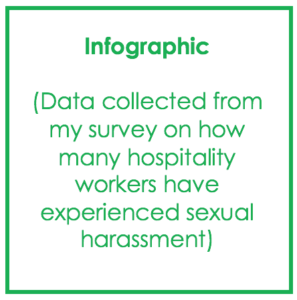 and hotels and we are (usually) greeted with great service and friendly faces to help us have a pleasant experience. But with these workers smiling back at you offering their help, would you expect [data from my survey to be inserted here for final project but will use The Guardians data for my draft] 89% of them to have experienced sexual harassment in their workplace? A shocking figure that should be cared about but simply isn’t. Sexual abuse has always been abundant in the industry and it doesn’t seem to be changing no matter how many reports are being made.
and hotels and we are (usually) greeted with great service and friendly faces to help us have a pleasant experience. But with these workers smiling back at you offering their help, would you expect [data from my survey to be inserted here for final project but will use The Guardians data for my draft] 89% of them to have experienced sexual harassment in their workplace? A shocking figure that should be cared about but simply isn’t. Sexual abuse has always been abundant in the industry and it doesn’t seem to be changing no matter how many reports are being made.
Back in 2017, the #metoo movement began to spread online after the Harvey Weinstein scandal came about. Many celebrities such as Katie Stevens, Ashleigh Murray and Lady Gaga got involved with the hashtag to share their sexual harassment experiences and support for the movement. It created a worldwide phenomenon to try bring sexual assault to the surface and truly show everyone how common the abuse is.
The phrase #metoo dates back to 2006 by American social activist Tarana Burke, who American actress Alyssa Milano credits when reviving the phrase in 2017. Milano intended to encourage victims to share their stories and “give people a sense of the magnitude of the problem”. The phrase was used more than 200,000 times by the end of October 15th when Milano orginially tweeted it and more than doubled to 500,000 the next day. Even actors such as James Van Der Beek and Terry Crews told their own experiences of abuse through the hashtag and proved it wasn’t just a female problem.
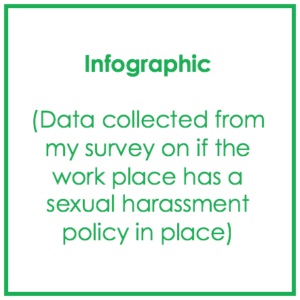 Many feminists stated that employers are now being forced to make changes in the workplace to improve their sexual harassment policies. For example, author Gloria Feldt claimed ‘women and men must work together. Leaders at companies will also have to dig deeper and create real change, including equal pay and a zero-tolerance policy for sexual harassment’. However, this doesn’t seem to be the case. In a recent survey of [data from my survey to be inserted here for final project but will use The Guardians data for my draft] 300 people,
Many feminists stated that employers are now being forced to make changes in the workplace to improve their sexual harassment policies. For example, author Gloria Feldt claimed ‘women and men must work together. Leaders at companies will also have to dig deeper and create real change, including equal pay and a zero-tolerance policy for sexual harassment’. However, this doesn’t seem to be the case. In a recent survey of [data from my survey to be inserted here for final project but will use The Guardians data for my draft] 300 people, 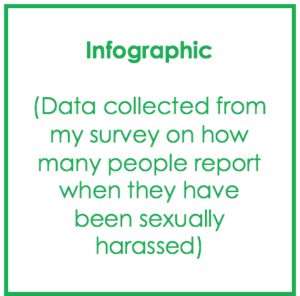 when asked if their workplace had an anti-sexual harassment policy in place, 77% either said no or they did not know. This could be one reason why [I have devised just a rough example here but I will use real data gathered from my survey] 82% of workers do not report when they have been sexually harassed at work. Another reason why workers do not report abusers is because they find it a difficult situation to be in and it’s difficult to tell them to stop, Shannon, a front of house at a hotel states.
when asked if their workplace had an anti-sexual harassment policy in place, 77% either said no or they did not know. This could be one reason why [I have devised just a rough example here but I will use real data gathered from my survey] 82% of workers do not report when they have been sexually harassed at work. Another reason why workers do not report abusers is because they find it a difficult situation to be in and it’s difficult to tell them to stop, Shannon, a front of house at a hotel states.
Hear her story:
[Interview with Bryan Simpson, a Unite the Union member, to be written out in this paragraph, planned 01/02. Most important questions to ask him:
- What’s your opinion on the current sexual harassment problem in the hospitality industry?
- Do you think enough is being done to the abusers?
- What could hospitality business owners be doing to protect their workers from these abusers?]
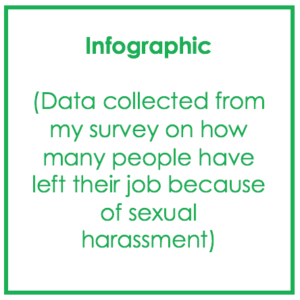 According to the Office for National Statistics, at the end of June 2018 there was just over 1.75 million people employed in the hospitality industry. An enormous amount of people who contribute to a combined turnover of approximately £100 billion in 2018. Consequently, it’s fair to say that we Britons need them in our lives and it would leave a massive unfillable gap if all the workers were to rebel against sexual abuse and quit their job. However, that isn’t the case. The survey also found that [I have devised just a rough example here but I will use real data gathered from my survey] 62% of people didn’t leave their job even though they had been harassed at work. Charlotte, a waitress at a London events company, told me one of the reasons behind this extraordinary statistic.
According to the Office for National Statistics, at the end of June 2018 there was just over 1.75 million people employed in the hospitality industry. An enormous amount of people who contribute to a combined turnover of approximately £100 billion in 2018. Consequently, it’s fair to say that we Britons need them in our lives and it would leave a massive unfillable gap if all the workers were to rebel against sexual abuse and quit their job. However, that isn’t the case. The survey also found that [I have devised just a rough example here but I will use real data gathered from my survey] 62% of people didn’t leave their job even though they had been harassed at work. Charlotte, a waitress at a London events company, told me one of the reasons behind this extraordinary statistic.
Hear her story:
What Charlotte mentions in her interview is another extremely important point to recognise in this industry. Men experience sexual harassment too. Women sexually assault too. Often some members of the public only understand sexual abuse to happen to females, but part of the #metoo movements agenda was to prove sexual harassment can happen to both genders. According to Survivors UK, an estimated 70,000 men are sexually abused or assaulted each year. Sometimes being too scared or embarrassed to speak out, men tend to keep their problems to themselves. The #metoo movement helped encourage the likes of Terry Crews to share his story of when a high-level Hollywood executive groped his genitals in front of his wife at an industry function. At the time Crews didn’t speak out due to fear of being ostracised or even being sent to prison. The fact he feared prison time proves the true extent of the problem and why men are too scared to speak out.
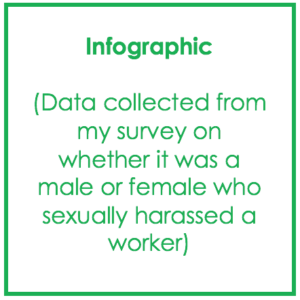 Crews is just one example of the acting industry, and in the hospitality industry lays the identical problem. The same survey found out that of those who have been sexually assaulted, [I have devised just a rough example here but I will use real data gathered from my survey] 45% of the time it has been by a female. This proves that whilst the people who took part have been harassed more by men, a huge portion have also been assaulted by women. Whilst men are often perceived as being the sexual abuser, it is proven that women are guilty too. Adam, who previously worked as a bartender at a nightclub, explains how he was inappropriately grabbed by a woman and actually had the courage to report her to his manager.
Crews is just one example of the acting industry, and in the hospitality industry lays the identical problem. The same survey found out that of those who have been sexually assaulted, [I have devised just a rough example here but I will use real data gathered from my survey] 45% of the time it has been by a female. This proves that whilst the people who took part have been harassed more by men, a huge portion have also been assaulted by women. Whilst men are often perceived as being the sexual abuser, it is proven that women are guilty too. Adam, who previously worked as a bartender at a nightclub, explains how he was inappropriately grabbed by a woman and actually had the courage to report her to his manager.
Hear his story:
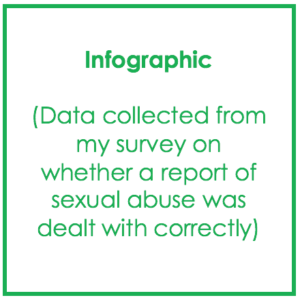 [This next paragraph will then lead onto Adam’s point of a report not being dealt with properly. It will include another statistic from my survey question “In your opinion was the problem dealt with properly?”]
[This next paragraph will then lead onto Adam’s point of a report not being dealt with properly. It will include another statistic from my survey question “In your opinion was the problem dealt with properly?”]
[This next paragraph will include an interview with “The Crane Event”, an events management company in Cambridge. Planned 30/01. Most important questions to ask them:
- What’s your opinion on the current sexual harassment problem in the hospitality industry?
- Do you think enough is being done to the abusers?
- What could hospitality business owners be doing to protect their workers from these abusers?
- Do you think hospitality workers are cared about as much celebrities?
- Do you think this will ever get resolved?]
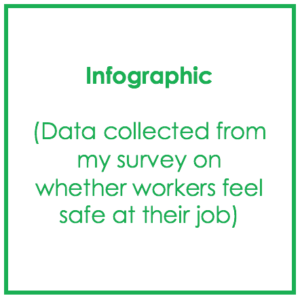 [This next paragraph will then lead on to talk about whether hospitality workers feel safe at work. It will then lead on to another statistic from my survey question “Do you feel safe at work?”, I will end the paragraph with another interview]
[This next paragraph will then lead on to talk about whether hospitality workers feel safe at work. It will then lead on to another statistic from my survey question “Do you feel safe at work?”, I will end the paragraph with another interview]
[I will include another “hear her story here” and then an edited 1-2 minute audio interview with a girl named Lauren who works in a pub – planned 05/02. Making sure to ask her if she feels safe at work to link in with previous paragraph]
There is no denying that we Briton’s love to have a drink. Sometimes there is nothing better than going out to an event and drinking alcohol with all of your friends. I myself know that hospitality workers get enjoyment out of watching people have fun, but it takes a turn for the absolute worst when people take having fun too far. People getting too drunk is a reoccurrence in the industry, and the workers are getting the brunt of it. Have you ever heard someone being excused of an action because “oh they was just drunk”? I’m sure you have. Imagine being a hospitality worker and hearing that every time you have been sexually harassed at work. Being drunk is never an excuse to sexually assault someone, but workers regularly face that phrase when they report it to someone. Abusers can often get away with being too drunk due to their high status.
Back in January last year, the Presidents Club dinner got exposed for its mens-only night of sexually harassing hostesses. For 33 years, it was an annual night intended as charity dinner to raise money for causes such as Great Ormond Street. Granted, it raised money for great causes but it has since been alleged that the male attendees sexually assaulted the 130 specifically hired hostesses. All of the workers, many of which were students, were told to wear skimpy black outfits with matching underwear and high heels, where at an after-party were being groped and sexually abused. The hostesses claimed there was men putting their hand up their skirt and one even said a man exposed his penis to her. An alcohol infused night indeed, but again that should still mean the workers shouldn’t get harassed – despite the abusers status or wealth. The function has now been shut down after it had been exposed, and rightfully so too. Now it is turn to protect the rest of hospitality workers rights, and stop any harassment happening to them.
[This next paragraph will include an interview with MP Gavin Shuker, member of a Women’s Equalities Committee. Planned 12/02. Most important questions to ask them:
- What’s your opinion on the current sexual harassment problem in the hospitality industry?
- Do you think enough is being done to the abusers?
- What could hospitality business owners be doing to protect their workers from these abusers?
- Do you think this will ever get resolved?]
[This will be the ending of the article, concluding my findings and emphasising the fact nothing is being done about sexual harassment in the hospitality industry. Mentioning the fact people care about celebrities stories but not normal people in our everyday lives. I will also be making the point that it is not normal and should never let being drunk as an excuse]
Research:
Sexual harassment in the hospitality industry
Hospitality industry = workers in bars, hotels, pubs, restaurants, clubs and events.
Key facts of the hospitality industry in the UK:
- In 2017, there were approximately 9.75 thousand hotel businesses operating in the UK (Stastica)
- 58% of the workforce is female and 45% of workers are under 30 (The Open University)
- The hospitality sector employs about two million people in 206,000 outlets across the UK and accounts for 4.5% of the UK’s total economic output, more than agriculture, forestry, fishing, energy, and water supply combined (The Open University)
- 31% of the workforce works in restaurants, 16% in bars/nightclubs and 12% in hotels (People 1stState of the Nation)
- 29% of people employed in the industry are under 21-years-old (Fourth analytics)
- 86% of workers in the industry are paid by the hour (Fourth analytics)
- 12 months is the average length of service (Fourth analytics)
- £7.71 is the average hourly rate (Fourth analytics)
- The total combined turnover of UK hospitality business is set to surpass £100b in 2018 (Office for National Statistics
- Just over 1.75 million people were employed in hospitality at the end of Jun 2018, a drop of 1% from the 1.77 million at the end of June 2017 (Office for National Statistics
- An estimated 70,000 men are sexually abused or assaulted each year (Survivors UK)
Sexual harassment in the hospitality industry facts:
- 89% said they have experienced one or more incidents of sexual harassment in their working life (The Guardian)
- Many employers accused of failing to protect staff from regular abuse (The Guardian)
- Of those who have been sexually harassed, 56.3% said it was from a member of the public and 22.7% said it was from a manager (Not on the Menu survey)
- Hostesses were allegedly groped, sexually harassed and propositioned by attendees of a Presidents Club charity dinner held at the Dorchester hotel (Financial Times)
- 40% of women and 18% of men have experienced harassment (Comres survery for BBC News)
- 77% of workers state they either don’t know or there isn’t an anti-sexual harassment policy in place (Guardian)
Survey Questions:
Aiming for at least 200 responses, posted on all social media websites and work forums.
https://lsbu.onlinesurveys.ac.uk/sexual-harassment-in-the-hospitality-industry
- Have you ever been sexually harassed at work?
- Did you report it to a manager?
- Did you leave your job because of it?
- In your opinion was the problem dealt with correctly?
- Who harassed you?
- Does your workplace have an anti-sexual harassment policy in place?
- Do you feel safe at work?
Unions to Protect the Hospitality Industry:
- Unite the Union
- UK Hospitality
- British Hospitality Association
- Usdaw
- GMB
Member of Parliament interview options (contacted all):
- Maria Miller (maria.miller.mp@parliament.uk)
- Tonia Antoniazzi (tonia.antoniazzi.mp@parliament.uk)
- Sarah Champion (sarah.champion.mp@parliament.uk)
- Angela Crawley (angela.crawley.mp@parliament.uk)
- Philip Davies (daviesp@parliament.uk)
- Vicky Ford (vicky.ford.mp@parliament.uk)
- Eddie Hughes (eddie.hughes.mp@parliament.uk)
- Jess Phillips (jess.phillips.mp@parliament.uk)
- Gavin Shuker (gavin.shuker.mp@parliament.uk)
- Tulip Siddiq (tulip.siddiq.mp@parliament.uk)
- Anna Soubry (soubry.mp@parliament.uk)
Member of Union Interview options (contacted all):
- Bryan Simpson (simpson@unitetheunion.org)
- Jody Whitehall (jody.whitehall@unitetheunion.org)
- Karen Viquerat (karen.viquerat@unitetheunion.org)
- Chantal Chegrinec (chantal.chegrinec@unitetheunion.org)
- Charlotte Bence (charlotte.bence@unitetheunion.org)
- Safeline (office@safeline.org.uk)
- Citizen Advice (press.office@citizenadvice.org.uk)
- UK Hospitality (info@ukhospitality.org.uk)
- Usdaw (pressoffice@usdaw.org.uk)
- GMB (press.office@gmb.org.uk)


